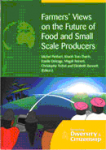- Acaparamiento de tierra
-
Politicas de tierra
- Por una nueva política de tierras agricolas en Francia
- Políticas de tierra e historia agraria en Europa
- Políticas de tierra en el medio rural en Francia durante el siglo XX
- La tenencia de la tierra en Africa occidental. Documentos pedagógicos.
- Reformas Agrarias en el Mundo
- La experiencia del Código Rural en el Níger
- Políticas de tierra y Reforma Agraria. Cuaderno de propuestas.
- Bosques
- Agua
- Gobernanza de los territorios
- FMAT - Foro Mundial sobre el Acceso a la Tierra 2016
- Otras Conferencias y Foros internacionales
- Videos de conferencias - Reuniones Temáticas de AGTER
- Entrevistas con algunos miembros de AGTER
- Capacitación - Enseñanza
- Formación - Viajes de estudio
- Enseñanza - Modulos de capacitación
- Editoriales - Boletín de información de AGTER
- Preservar el medio ambiente y los grandes equilibrios ecológicos
- Mejorar la participación de los pueblos a la toma de decisión a nivel nacional y a nivel local
- Respetar los derechos humanos fundamentales. Disminuir las desigualdades
- Construir una gobernanza mundial eficaz. Construir la paz
- Hacer que la producción agrícola cumpla eficientemente con sus roles. Eliminar el hambre
- Valorar y proteger la diversidad cultural
- Tomar en cuenta las necesidades de las futuras generaciones. Administrar los «comunes»
Título, subtítulo, autores. Búsqueda en www.agter.org y en www.agter.asso.fr
Búsqueda en texto completo con Google
Versión Española: Visión de los Agricultores sobre el Futuro del Alimento y de los Productores de Pequeña Escala
Farmers’ Views on the Future of Food and Small-Scale Producers
Escrito por: Michel Pimbert, Khanh Tran-Thanh, Estelle Deléage, Magali Reinert, Christophe Trehet, Elizabeth Bennett, (Editors)
Fecha de redaccion:
Organizaciones: International Institute for Environment and Development (IIED)
Tipo de documento: Artículo / documento de difusión amplia
Fuentes documentales
Farmers’ Views on the Future of Food and Small-Scale Producers. Summary of an Electronic Conference, 14 April to 1 July, 2005.
Organised by: The International Institute for Environment and Development (IIED), Progressio (formerly CIIR – Catholic Institute for International Relations), The Small and Family Farms Alliance, The UK Food Group, The Indigenous Peoples’ International Centre for Policy Research and Education (TEBTEBBA)
Resumen
How – and under what conditions – can diverse, localised food systems be sustained in the twenty-first century? Who gains and who loses when local food systems are strengthened? These are some of the questions examined by the Sustaining Local Food Systems, Agricultural Biodiversity and Livelihoods project.
This project combines a political ecology perspective on food systems and livelihoods with action research grounded in local practice. Research is done with, for and by people – rather than on people – to bring together many different ways of knowing and types of knowledge for learning and change. As such this action research seeks to bridge the gap between the academic orientation of political ecology and the largely activist focus of food sovereignty, human rights and environmental justice movements.
The Reclaiming Diversity and Citizenship Series publishes lessons from case studies in India, Indonesia, Iran and Peru along with findings from other studies linked with this action research project. Contributors are encouraged to reflect deeply on the ways of working and outcomes of their research, highlighting implications for policy, knowledge, organisations and practice. The Reclaiming Diversity and Citizenship Series also seeks to encourage debate outside mainstream policy and conceptual frame works on the future of food, farming and land use. The opportunities and constraints to regenerating local food systems based on social and ecological diversity, human rights and more inclusive forms of citizenship are actively explored by contributors.
The research project and this publication series are co-ordinated by Michel Pimbert in the ‘Sustainable Agriculture, Biodiversity and Livelihoods’ Programme at the International Institute for Environment and Development (IIED). It receives financial support from the Netherlands Ministry of Foreign Affairs (DGIS).

The outcomes of an electronic conference that took place from April to July 2005, on the ‘Future of Food and Small Scale Producers’ are presented in this report. The conference was organised by The International Institute for Environment and Development (IIED), Progressio (formerly CIIR – Catholic Institute for International Relations), The Small and Family Farms Alliance, The UK Food Group, and The Indigenous Peoples’ International Centre for Policy Research and Education (TEBTEBBA).
« The electronic discussion primarily involved indigenous, small and family farmers, landless and fisherfolk as well as their representative organisations. The focus was on small-scale food producers – women and men who produce and harvest field and tree crops as well as livestock, fish and other aquatic organisms. The EConference process was thus specifically designed to allow the excluded to voice their views, analysis and priorities on the future of food, farming, environment and human well being.
Contributors were invited to describe the practice and underlying rationale of farmers and indigenous peoples’ alternatives to the modernization and industrialization of food, agriculture and land/water use. The views and analysis of small scale producers that are summarised in this report offer a deeper understanding of alternative movements in rural and urban areas. Contributors explain why keeping farmers and indigenous peoples on their land is of fundamental importance for the well being of society and nature throughout the world. »
We want to thank Michel Pimbert for allowing us to present this document on AGTER’s website.

 Agter participa en la Coredem
Agter participa en la Coredem